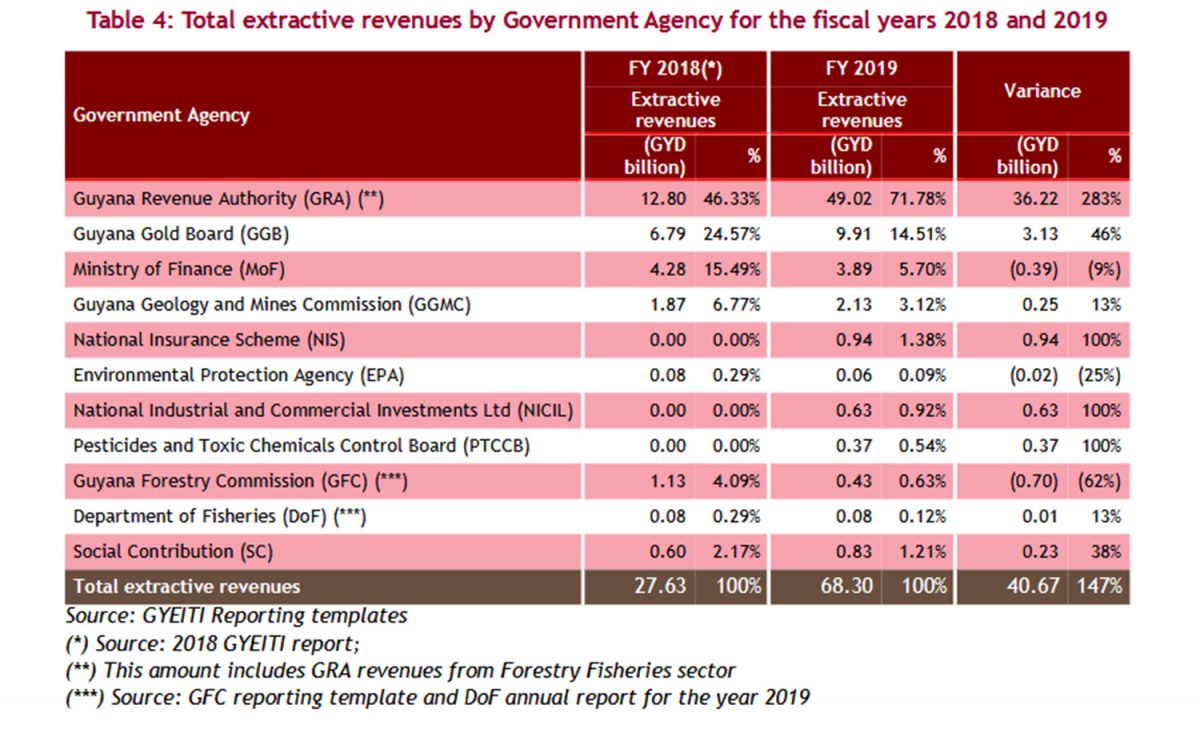In 2019, Guyana earned some $68.3 billion from the extractive sector, with the majority of that amount coming from the oil and gas industry, the recently released 2019 financial report of the Guyana Extractive Industries Transparency Initiative (GYEITI) states.
This is the third such report produced by Guyana under the EITI scheme and was released yesterday. The report was submitted to the international EITI Board on May 30, 2022.
In a statement, the GYEITI Secretariat said that total revenues received from the extractive sector amounted to $68.30 billion in 2019 with the Guyana Revenue Authority (GRA) accounting for 72% of the total revenue streams generated by the sector.
The Guyana Gold Board (GGB) and the Ministry of Finance (MoF) accounted for 15% and 6%, respectively. It added that in 2019, the extractive sectors contributed 19.42% to gross domestic product (GDP), 24.94% to revenues, 72.66% to exports, and 17.40% to employment.
In accordance with Requirement 4.1 of the 2019 EITI Standard 2019, the 2019 report covers payments made by extractive entities and revenues received by Government Agencies from those entities. It also contains contextual information about oil and gas, mining, forestry, and fisheries, in line with EITI Requirements 2, 3, 4, 5 and 6.
The GYEITI Secretariat said that the report also includes a summary description of the legal framework and fiscal regime, an overview of Guyana’s extractive sector, the contribution of the extractive sector to Guyana’s economy, production data, the State’s shareholding in extractive entities, revenue allocations, licence registers, and licence allocations.
The report was completed by BDO LLP, a UK-based auditing firm that won the tender for the contract for the compilation of Guyana’s 3rd EITI report. GYEITI added that the report builds on the previous reports – for fiscal years 2017 and 2018 – and shows solid progress in meeting the EITI Standard 2019. It also chronicles the progress Guyana has made in implementing the recommendations of the previous reports, some of which relate to the implementation of new ways of capturing EITI-required information from stakeholders by government agencies, whether miners, beneficial owners, and/or taxpayers.
“As a result of the difficulties faced by many reporting countries due to the COVID-19 pandemic, the EITI International Secretariat proposed ‘Flexible Reporting’ for the fiscal year 2019. Guyana’s Multi-Stakeholder Group (MSG) made the decision to adopt the Flexible Reporting option which meant that only the oil and gas subsector of Industry was subject to reconciliation, while the subsectors of mining, forestry, and fisheries were subject only to unilateral disclosure by the relevant government agencies and departments.
“Work on this report commenced in October 2021 shortly after the appointment of the new MSG on September 20th, 2021. As a result of the time lost awaiting the new MSG, Guyana had applied for a five-month extension of the deadline for the report’s completion,” the statement added.
The report informed that the Bureau of Statistics’s information showed that the GDP from forestry, fisheries, mining, oil and gas sectors for 2019 amounted to $187.10 billion and accounted for 19.42% of total GDP. The contribution of all four sectors to the Government’s revenue amounted to $68.30 billion accounting for 24.94% of the total domestic revenues in 2019.
The value of exports from the extractive sectors amounted to $236.89 billion accounting for 72.66% of the total exports of the country.
Guyana started production of crude oil in December 2019 in the Liza-I Well while the first shipment of exports took place on 20 January 2020. The report informed that ExxonMobil and its partners, operating in the Stabroek Block, produced some 427,282 barrels of oil at a value of US$26,435,937 or just over GY$5.4 billion.
In accordance with the Guyana Labour Force Survey covering the year 2019, there were 239,014 persons employed in Guyana, of whom 41,589 were employed in the forestry, fisheries, mining, oil and gas sectors, representing 17.4% of total employment. The Bureau of Statistics follows the “International Standard Industrial Classification of All Economic Activities – Revision 4” published by the United Nations and which combines the extraction of solid minerals and liquids (petroleum) or gases (natural gas). Similarly, the Guyana Labour Force Survey combines forestry and fisheries
Data submissions
The report said that 6 out of 7 oil and gas companies holding active licences during 2019 submitted reporting templates. Receipts reported by Government Agencies and relating to these extractive entities amounted to $12.43 billion accounting for 99.99% of the reconciled revenues.
For the company that did not submit its reporting templates, receipts reported by Government Agencies
relating to this company amounted to $53,900 accounting for 0.01% of the reconciled revenues. The total revenues collected by GRA and the Pesticides and Toxic Chemicals (Control) Board from this company could not be estimated because of the lack of corresponding reporting templates from Government Agencies.
The company explained that it was unable to submit a report since it is currently discussing the renewal of its lease period with the Guyana Geology and Mines Commission (GGMC) and the Ministry of Natural Resources.
The report highlighted that the GGMC, the Guyana Gold Board, the Environmental Protection Agency and National Industrial and Commercial Investments Limited submitted their reporting templates to confirm total receipts of $12.73 billion accounting for 19% of the total revenues. The Ministry of Finance submitted reporting templates for two extractive entities namely AGM Inc. and Troy Resources Inc for a total amount of $3.89 billion accounting for 6% of the extractive revenues.
GRA submitted 9 reporting templates for a total of $12.85 billion. The reporting templates submitted related to six oil and gas and three mining companies which previously provided signed waivers. Due to legal confidentiality constraints, GRA was not able to submit reporting templates for one oil and gas company and the other mining companies included in the unilateral disclosure.
Additionally, GRA provided a statement of revenues collected from oil and gas, mining, forestry and fisheries companies without disclosing their names or their Taxpayer Identification Number (TIN). Based on the previous, the total revenues collected amounted to $49.02 billion accounting for 72% of the total extractive revenues.
The National Insurance Scheme provided a statement of revenues collected from the oil and gas companies as well as disaggregated revenues collected from 37 mining companies totalling $782 million. accounting for less than 1% of the total extractive revenues. Additionally, the information on revenues collected from the forestry sector was also provided amounting to $163 million.
The Pesticides and Toxic Chemicals (Control) Board submitted the statement of aggregated revenues collected from the oil and gas and mining totalling $372 million without disclosing the details by the company accounting for less than 1% of the total extractive revenues.
In the absence of critical data, the report informed that it was possible to conclude that it covers all significant contributions made by the extractive entity to the revenues of Guyana in the fiscal year 2019.
The report highlighted that while GRA, GGB, EPA and NICIL provided signed reporting templates, the GGMC submitted partially completed templates amounting to $2.1 billion. The Ministry of Finance did not sign its templates for Troy Resources Guyana Inc. and Aurora Gold Mines which amounted to $3.89 billion.
Additionally, the report related that reporting templates that were submitted by Government Agencies had not been certified by the Auditor General.
For the oil and gas companies, three submitted signed templates while three did not. The revenues reported by Government Agencies in respect of companies which submitted reporting templates not signed by management amounted to $12.34 billion representing 99.26% of the total reconciled revenues.
Repsol Exploracion Guyana, submitted reporting templates without its audited financial statements while none of the companies submitted reporting templates certified by an external auditor.
“Given the significance of the matters stated above, it was not possible to conclude that the financial data submitted by reporting entities and included in this report were subject to audits that have been performed in accordance with international standards,” the report concluded.









